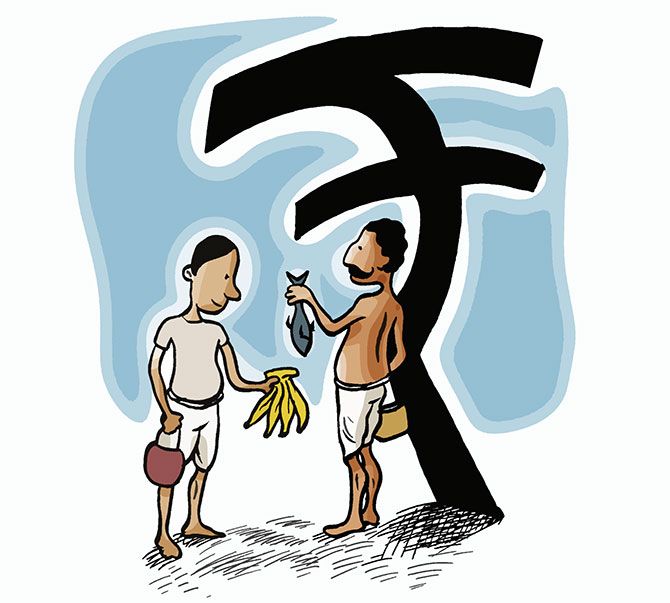The banana grower, like everyone else in the village, was buying all his daily requirements on credit.
The grocer, fishmonger and vegetable seller were all happily dispensing with their goods and keeping account of who owed what.
Geetanjali Krishna discovers how the note ban is impacting a tiny village in Odisha.
Illustration: Dominic Xavier/Rediff.com

The other day when Krishna returned after a three-week trip back home from Sambalpur in Odisha, she was full of stories of how demonetisation had affected everyday life in her village.
One story, in particular, stood out.
"My old aunt came to see me and brought some bananas as a present," said Krishna.
It turned out that she had bought the bananas on credit from another relative who grew them.
"So when I met the banana-growing relative, I asked him if he had been giving bananas on deferred payment basis to a lot of people," she recounted.
He had no option, the banana grower replied.
If he didn't, his bananas would rot.
Having learnt some brash city ways, Krishna asked him bluntly how he was making ends meet if he was not getting paid for his bananas.
"He laughed at me, saying that I had become too 'citified' to remember how things were in our village," she said.
The banana grower, like everyone else in the village, was buying all his daily requirements on credit.
"The grocer, fishmonger and vegetable seller were all happily dispensing with their goods and keeping account of who owed what," she said incredulously.
"And all my relatives, who had never taken loans in their lives, were now living off credit."
I had heard of barter economies being revived in villages post demonetisation, but this network of borrowers was something new.
"Surely, somebody would need to be paid at some point," I said.
Krishna agreed. "It doesn't seem like a sustainable system to me either," she said.
"I guess they are all waiting for cash to become more freely available to repay each other."
She said that having lived in Delhi for over 20 years, the idea that any city shopkeeper would be happy to take credit not once or twice, but for an indefinite period of time, was unthinkable.
As of now, however, her rural relatives seemed okay with their cashless lives.
"Of course, they all have bank accounts," she said, "but the bank is too far away and cash is still in short supply. The few lucky ones, who managed to get to the top of the line, reported that they were given cash either in Rs 2,000 notes or in Rs 10 coins. And both proved equally inconvenient to spend."
Krishna also noted that as more and more people were managing to successfully get cash from their banks, more interesting ways to pay were emerging in the village.
"As people now have large denomination notes but no change, shopkeepers keep adding up the amount each customer owes them, until the figure reaches Rs 2,000," she said.
"Then they expect to be paid with a single note."
However, several village elders, including Krishna's father-in-law, have been grumbling that notebandi has encouraged, what they consider, the unhealthy practice of taking loans.
"They say that some will inevitably renege on their loans and the atmosphere of trust in the village will get corroded," she said.
So while on the surface life seemed uneventful in Krishna's village of mutual borrowers, everyone was a little on the edge.
"Initially, everyone hoped that the cash crunch would be over by December 31, now they're hoping that things would at least ease by January-end," she said.
"I worry about what will happen if the problem is prolonged. A market based on credit is a risky one."
Given that bad loans have tripped up economies mightier than the bazaar of Krishna's tiny Odisha village, I couldn't agree more.
Meanwhile, she sighed and echoed the thoughts of many people I know: "I guess all we can do is wait and watch."













 © 2025
© 2025